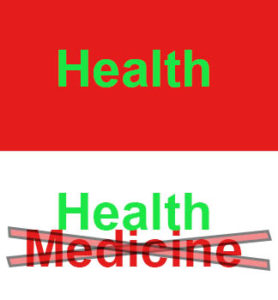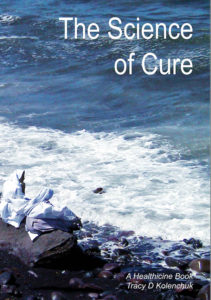 One of the things I find annoying in medical publications is the nonsense use of the word “health” in place of medical terms.
One of the things I find annoying in medical publications is the nonsense use of the word “health” in place of medical terms.
Below is a recent editorial published in the Lancet, with every incorrect use of the word “health” corrected to “medicine” or “medical”.
Of course, I might have made some mistakes – it’s hard to know the intent of the authors when such propaganda motivated doublespeak, newspeak, doublethink, wordsmithing is so commonplace it becomes invisible. Every instance of the word HEALTH in the entire article that becomes more accurate when replaced by MEDICINE or MEDICAL. Judge for yourself.
HealthMedical Systems for Prosperity and Solidarity: Tallinn 2018
============================================================
Last week, ministers of healthmedicine, policy makers in healthmedicine and finance, patient organisations, and academic advisers met in Tallinn, Estonia, to discuss the future of European healthmedical systems. Under the stewardship of WHO’s Regional Office for Europe (WHO EURO), and hosted by Estonia’s President, Kersti Kaljulaid, and Minister of healthSickness and Labour, Riina Sikkut, 250 or so representatives of WHO EURO member states celebrated the tenth anniversary of the Tallinn Charter and agreed on principles for building sustainable people-centred healthmedical systems.
In 2008, the Tallinn Charter shaped thinking about the importance of healthmedical systems and the inter-relatedness of healthmedical treatments and wealth. The Charter committed signatory WHO EURO member states to improve healthmedical treatments by investing in and strengthening their healthmedical systems, and to promote the shared values of solidarity, equity, and participation. Underpinning the Charter were the principles that high-performing healthmedical systems contribute to better healthmedical and economic development, and that no one should become poor because of illness.
But later in 2008, the financial crisis hit, leading to hardship and widespread austerity measures in many member states and, in some, to deep cuts to healthmedical budgets. Tallinn Charter commitments were derailed, out-of-pocket healthmedical expenditure increased, and investment in healthmedical systems decreased in many countries. Nevertheless, the past decade has seen some metrics improve, such as life expectancy at birth and tuberculosis case detection. But progress is variable between and within countries, slow in many, and widespread inequalities persist.
Where now for the Tallinn Charter? Last week saw renewed commitment to the fundamental principles of the Charter through adoption of three themes to achieve faster and more equitable healthmedical gains. Participants agreed to “include, invest, and innovate” to strengthen their healthmedical systems. Ministers of healthmedicine and policy makers agreed that the healthmedical needs of their populations can best be met by improving coverage, access, and financial protection; making the case for investing in healthmedical systems; and harnessing innovations in healthmedical care.
How to improve inclusion, to ensure universal healthmedical coverage, was discussed in the context of financial protection. HealthMedical systems play a crucial part in protecting individuals from the financial hardship caused when out-of-pocket payments for healthmedicines, such as prescription charges or dental care, are greater than a household’s ability to pay. New evidence on financial protection was presented in Tallinn based on analyses across 25 European countries. Even with “universal healthmedical coverage”, up to 8% of households in Europe cannot afford to pay for basic needs (food, rent, utility bills) after paying out-of-pocket charges, especially for medicines and dental care. These costs are still causing people to fall into poverty or to do without care; for many in Europe, medicines or dental care, or other healthmedical-care costs, are simply not affordable. The risks are greatest where out-of-pocket payments are over 15% of total spending on health, especially if pro-poor policies are absent.
It is still necessary to make the economic case for investing in healthmedical systems. Competing demands upon ministries of finance serve to emphasise the need to demonstrate good stewardship of public resources, including measures to reduce healthmedical-system inefficiencies and waste, but there is now strong evidence that spending on healthmedicine contributes to better healthmedical outcomes, promotes macroeconomic growth, supports societal wellbeing, and enhances fiscal sustainability of healthmedical systems.
It is important to strive for continuous improvement to healthmedical systems to benefit populations. HealthMedical systems have been slow to innovate in many countries, but key factors that help include supportive leadership, early involvement of clinical staff, dedicated resources including funding, staff, and time, and evaluation of the benefits and costs. Remembering the needs of the public and patient is paramount—innovations that are not needed, wanted, or are too complex will fail.
Inclusion, investment, and innovation are useful themes to build sustainable healthmedical systems for the future. The key message from Tallinn 2018 is European solidarity to improve healthmedical outcomes, decrease inequalities, and deliver universal medical coverage. “Everything we do to improve medical outcomes, decrease inequalities, and strengthen healthmedical security is fundamentally driven by our European social values of solidarity, equity, and universalism”, Hans Kluge (WHO EURO) told The Lancet. HealthMedicalsystems must be person-centred and flexible to allow change and innovation. Leadership from healthmedical ministers, policy makers, academics, and clinicians will be crucial to implementing the recommendations from Tallinn 2018.
==============================================
I must confess, I find it hard to imagine what a Lancet article or editorial might look like if it actually used the word “health” to mean “health” instead of using it to refer to illness and medicine. I suspect that, given the dearth of studies of healthicine, they would have nothing to say.
You can view the original version at the Lancet:
https://www.thelancet.com/journals/lancet/article/PIIS0140-6736(18)31355-2/fulltext?



Hello my name is Dina nina .from United State…I want to let the world know about Dr,Egbe the Great spell caster that brought back my boyfriend to me when i thought all hope was lost. we were 3years in our relationship when my boyfriend left me for another woman. Dr,Egbe used his powerful spell to put a smile on my face by bringing back my boyfriend with his spell, at first i thought i was dreaming when my boyfriend came back to me on his knees begging me to forgive him and accept him back and ever since then he loves me more than i ever expected so i made a vow to my self that i will let the World know about Dr,Egbe because he is a God on earth. Do you have problems in your relationship ? have your partner broke up with you and you still love and want him back ? contact Dr,Egbe today for i give you 100% guarantee that he will help you just as he helped me.CONTACT his Dr,Egbe can heal you this is His email: via egbegodytemple@hotmail.com
Dr,Egbe CAN AS WELL CURE THE FOLLOWING DISEASE:
1. Herpes
2. Cancer
3. Hiv/Aids
4. Hepatitis
5. Brings My Ex back
6. Leprosy
7. SARS
8. Bubonic Plague
9. Cerebrovascular Disease
10. Lower Respiratory Infections
11. Syphilis
12. Influenza A-H1N1 (Swine Flu)
13. Ischemic Heart Disease
14. Chronic Obstructive Pulmonary Disease
15. Whooping Cough
16. Perinatal Complications
17. Diarrhea
18.. Lung Cancer
19. Influenza
20. childlessness
21. Measles
22.metal problems.
23 if anyone want to get how Menstruation back again
REMEMBER — sickness is not our friends this virus infection diseases. the more it stay in your body the more it keep destroying your body organs..via email. egbegodytemple@hotmail.com